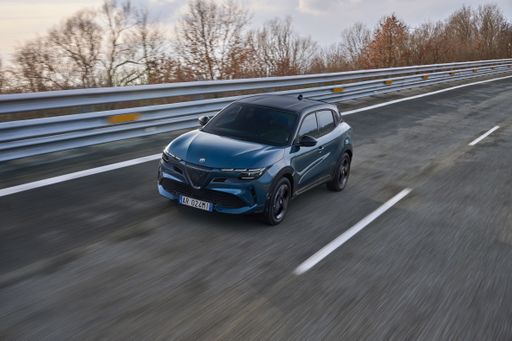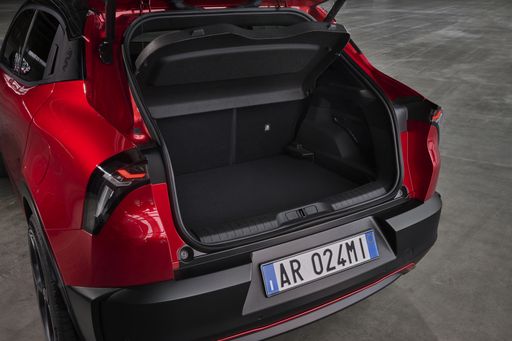Alfa Romeo Junior vs Renault Trafic Bus – Differences & prices compared
Everyday use, family trips or long-distance drives – here’s where the differences show.
Discover whether Alfa Romeo Junior or Renault Trafic Bus fits your lifestyle better.
Costs and Efficiency:
When it comes to price and running costs, the biggest differences usually appear. This is often where you see which car fits your budget better in the long run.
Alfa Romeo Junior has a clearly advantage in terms of price – it starts at 25700 £, while the Renault Trafic Bus costs 38200 £. That’s a price difference of around 12568 £.
Fuel consumption also shows a difference: Alfa Romeo Junior manages with 4.80 L and is therefore evident more efficient than the Renault Trafic Bus with 6.70 L. The difference is about 1.90 L per 100 km.
Engine and Performance:
Power, torque and acceleration say a lot about how a car feels on the road. This is where you see which model delivers more driving dynamics.
When it comes to engine power, the Alfa Romeo Junior has a noticeable edge – offering 280 HP compared to 170 HP. That’s roughly 110 HP more horsepower.
In acceleration from 0 to 100 km/h, the Alfa Romeo Junior is clearly quicker – completing the sprint in 5.90 s, while the Renault Trafic Bus takes 10.60 s. That’s about 4.70 s faster.
In terms of top speed, the Alfa Romeo Junior performs somewhat better – reaching 206 km/h, while the Renault Trafic Bus tops out at 180 km/h. The difference is around 26 km/h.
There’s also a difference in torque: Renault Trafic Bus pulls slight stronger with 380 Nm compared to 345 Nm. That’s about 35 Nm difference.
Space and Everyday Use:
Whether family car or daily driver – which one offers more room, flexibility and comfort?
Seats: Renault Trafic Bus offers significantly more seating capacity – 9 vs 5.
In curb weight, Alfa Romeo Junior is significantly lighter – 1380 kg compared to 2031 kg. The difference is around 651 kg.
In maximum load capacity, the Renault Trafic Bus performs significantly better – up to 4000 L, which is about 2720 L more than the Alfa Romeo Junior.
When it comes to payload, Renault Trafic Bus convincingly takes the win – 982 kg compared to 420 kg. That’s a difference of about 562 kg.
Who comes out on top?
Overall, the Alfa Romeo Junior shows itself to be won narrowly and secures the title of DriveDuel Champion.
It convinces with the more balanced overall package and proves to be the more versatile choice for everyday use.
 @ Alfa Romeo / Stellantis Media
@ Alfa Romeo / Stellantis Media
Alfa Romeo Junior
Alfa Romeo Junior
The Alfa Romeo Junior captures the essence of Italian design with its sleek lines and compact dimensions, making it an icon of elegance and performance. With a spirited driving experience and a charming retro aesthetic, it appeals to enthusiasts and casual drivers alike. This delightful car embodies the brand's rich heritage while remaining a fun and engaging option for those seeking a unique automotive experience.
details @ Alfa Romeo / Stellantis Media
@ Alfa Romeo / Stellantis Media
 @ Alfa Romeo / Stellantis Media
@ Alfa Romeo / Stellantis Media
 @ Alfa Romeo / Stellantis Media
@ Alfa Romeo / Stellantis Media
Renault Trafic Bus
The Renault Trafic Bus is a versatile and spacious option for those needing to transport multiple passengers comfortably. With its modern design and practical features, it is well-suited for both business and leisure purposes. Its efficient engine and smooth handling make it a reliable choice for long journeys.
details
 @ Alfa Romeo / Stellantis Media
@ Alfa Romeo / Stellantis Media
|
|
|
|
|
Costs and Consumption |
|
|---|---|
|
Price
25700 - 41600 £
|
Price
38200 - 54400 £
|
|
Consumption L/100km
4.8 - 5.4 L
|
Consumption L/100km
6.7 - 7.2 L
|
|
Consumption kWh/100km
15.1 - 17.5 kWh
|
Consumption kWh/100km
-
|
|
Electric Range
344 - 410 km
|
Electric Range
-
|
|
Battery Capacity
0.4 - 51 kWh
|
Battery Capacity
-
|
|
co2
0 - 119 g/km
|
co2
175 - 189 g/km
|
|
Fuel tank capacity
44 - 45 L
|
Fuel tank capacity
80 L
|
Dimensions and Body |
|
|---|---|
|
Body Type
SUV
|
Body Type
Bus
|
|
Seats
5
|
Seats
8 - 9
|
|
Doors
5
|
Doors
4
|
|
Curb weight
1380 - 1689 kg
|
Curb weight
2031 - 2352 kg
|
|
Trunk capacity
340 - 415 L
|
Trunk capacity
-
|
|
Length
4173 mm
|
Length
5080 - 5480 mm
|
|
Width
1781 mm
|
Width
1956 mm
|
|
Height
1505 - 1538 mm
|
Height
1973 - 1974 mm
|
|
Max trunk capacity
1205 - 1280 L
|
Max trunk capacity
3200 - 4000 L
|
|
Payload
390 - 420 kg
|
Payload
718 - 982 kg
|
Engine and Performance |
|
|---|---|
|
Engine Type
Electric, Petrol MHEV
|
Engine Type
Diesel
|
|
Transmission
Automatic
|
Transmission
Manuel, Automatic
|
|
Transmission Detail
Dual-Clutch Automatic, Reduction Gearbox
|
Transmission Detail
Manual Gearbox, Automatic Gearbox
|
|
Drive Type
Front-Wheel Drive, All-Wheel Drive
|
Drive Type
Front-Wheel Drive
|
|
Power HP
136 - 280 HP
|
Power HP
110 - 170 HP
|
|
Acceleration 0-100km/h
5.9 - 9.1 s
|
Acceleration 0-100km/h
10.6 - 16.5 s
|
|
Max Speed
150 - 206 km/h
|
Max Speed
161 - 180 km/h
|
|
Torque
230 - 345 Nm
|
Torque
300 - 380 Nm
|
|
Number of Cylinders
3
|
Number of Cylinders
4
|
|
Power kW
100 - 207 kW
|
Power kW
81 - 125 kW
|
|
Engine capacity
1199 cm3
|
Engine capacity
1997 cm3
|
General |
|
|---|---|
|
Model Year
2024 - 2025
|
Model Year
2023 - 2025
|
|
CO2 Efficiency Class
A, C, D
|
CO2 Efficiency Class
G, F
|
|
Brand
Alfa Romeo
|
Brand
Renault
|
What drive types are available for the Alfa Romeo Junior?
Available configurations include Front-Wheel Drive or All-Wheel Drive.
The prices and data displayed are estimates based on German list prices and may vary by country. This information is not legally binding.
